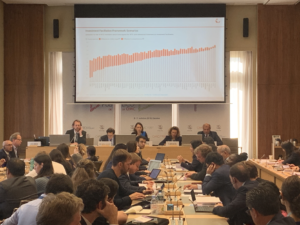
Axel Berger presented the new Investment Facilitation Index (IFI) at the Public Forum of the World Trade Organization (WTO) on 10 and 11 October 2019 in Geneva.
The index maps the adoption of investment facilitation measures at domestic level and serves as a basis for future research on the economic benefits and costs of an international framework for investment facilitation that is currently being discussed among WTO members. A key result of the IFI is that developing countries, which potentially benefit the most from investment facilitation reforms, face major challenges to implement international disciplines on investment facilitation.
Discussions at the WTO Public Forum made clear that further research and policy dialogue is needed to better align investment facilitation initiatives with the demands of sustainable developments and the 2030 Agenda.
